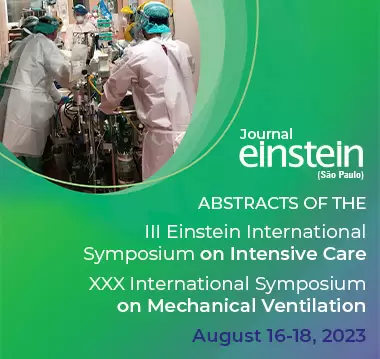einstein (São Paulo). 15/Aug/2023;21(Suppl 1):EISIC_MV0009.
Effects of inspiratory muscle training on weaning from mechanical ventilation and other aspects: a systematic review
DOI: 10.31744/einstein_journal/2023ABS_EISIC_MV0009
III Einstein International Symposium on Intensive Care and the XXX International Symposium on Mechanical Ventilation. Aug 16-18, 2023.
Category: Pneumology
Introduction:
About 35% of patients admitted to Intensive Care Units (ICU) require mechanical ventilation. Prolonged mechanical ventilation predisposes patients to increased risks of MV- associated pneumonia, tracheal ischemia, lung damage, and diaphragmatic dysfunction. Such problems increase the risk of mortality and complications. Among the proposed treatments in these cases, inspiratory muscle training has been used as a means of improving the strength and endurance of the respiratory muscles. There are still few studies that evaluate inspiratory muscle training in patients on MV as a means of optimizing weaning.(-).
Objective:
To verify the effects of inspiratory muscle training on weaning from mechanical ventilation.
Methods:
This study is a systematic review, where a search on the subject was carried out in the Pubmed and Virtual Health Library databases, in accordance with PRISMA recommendations, from January to June 2023. The descriptors were used inspiratory muscle training AND mechanical ventilation AND weaning, in Portuguese, English and Spanish. Randomized clinical trials where inspiratory muscle training was used during weaning or post-weaning from mechanical ventilation were included, excluding studies that used other techniques compared to respiratory muscle training, systematic and literature reviews, case studies, cohort studies and other designs that were not randomized clinical trials. The articles found dated from 2003 to 2021.
Results:
In all, 79 results were found, being analyzed after analyzing titles and abstracts, eight randomized clinical trials. The groups that underwent inspiratory muscle training showed an increase in inspiratory strength assessed by the maximum inspiratory pressure (p=0.02), improvement in quality of life (p=0.03) and reduction in in-hospital mortality (p=0.051). Some authors did not find significant reductions in weaning time, while others found better results in the intervention group on the 60th day in the ICU in terms of survival (p=0.030) and weaning (p=0.001). No significant differences in the possibility of extubation and no reduction in the rate of reintubation were reported. In older studies, inspiratory muscle strength remained constant throughout mechanical ventilation, regardless of whether or not mechanical ventilation was performed.
Conclusion:
Inspiratory muscle training has shown positive results in improving inspiratory muscle strength, quality of life and reducing mortality, however, its effectiveness regarding weaning is still controversial, with studies demonstrating improvement in weaning, others not. Older studies tended to demonstrate fewer effective results from the technique, while the most current ones observed better outcomes with the use of training.
342


